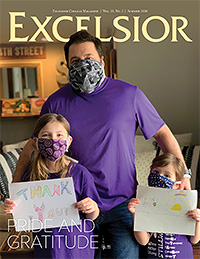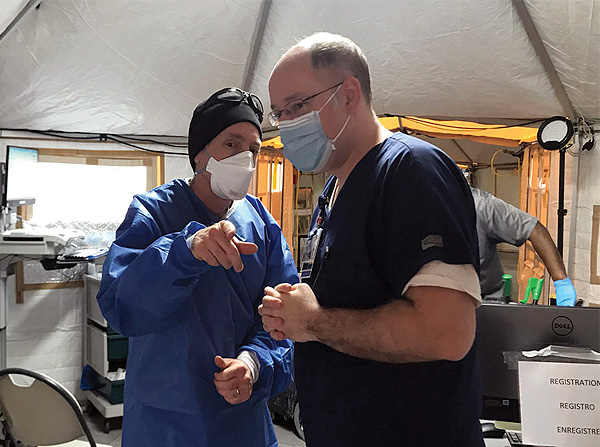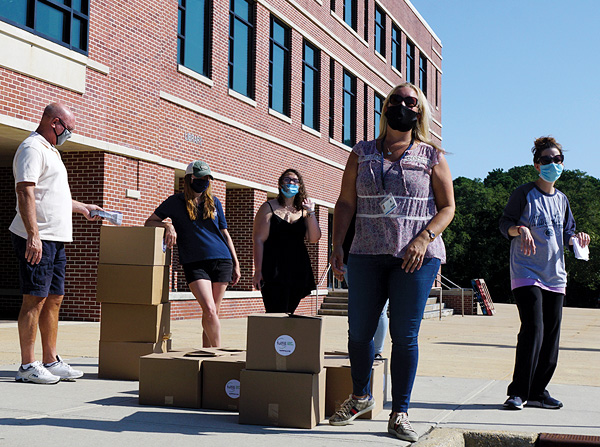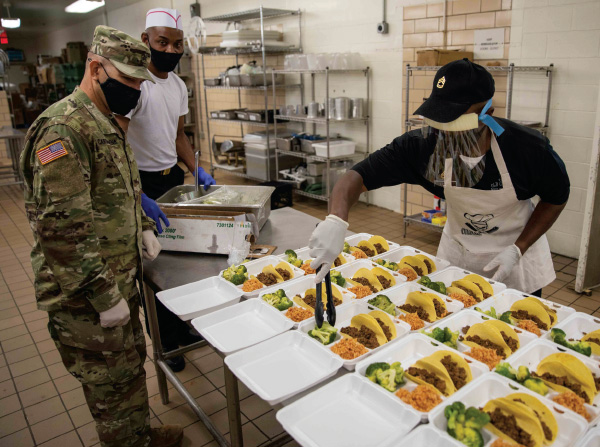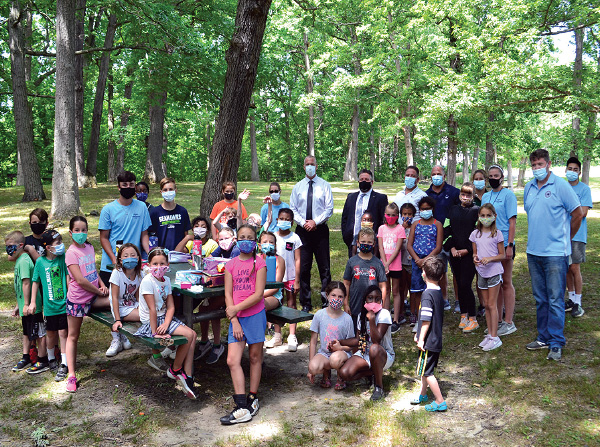Jobs in the Cannabis Industry
The cannabis industry has many different options when it comes to choosing your career path, allowing you ample opportunities to get into the industry from just about any angle. To help you figure out which path you’d like to take, we’ve broken down some common jobs you will find, and what those positions entail.
Risk Management for Cannabis
Risk management is the practice of identifying and evaluating potential risks and strategizing how to reduce them as well as to control them should they happen. Since cannabis is federally illegal, operating in the cannabis industry poses many potential risks. Businesses of all types— from dispensaries and grow operations to ancillary companies—face risks, and they do not have access to the same risk management tools that other industries do, such as bankruptcy law protection or credit cards. An individual in this position is responsible for mitigating risks that are considered a liability to the company, such as faulty security measures, defective product packaging, expired licenses, and more. As a result, a position in risk management in the cannabis industry is a firm choice, as it is one of the most important departments a cannabis business can have.
Cannabis Compliance
Compliance professionals ensure their businesses are following all ethical and legal requirements, and they stay up to date on regulations and laws in an effort to minimize the risk of violating them and potentially losing licenses. Compliance risks can include violating regulations related to cannabis-growing, product packaging, and security requirements, as well as making false claims and failing to disclose required information. As regulations and laws are constantly changing for cannabis, and are different for every state, keeping up with them and ensuring the company adheres to their nuances is extremely important in keeping cannabis businesses from being shut down. Just like risk management, this is a vital role in any business, and being a compliance manager will make you an invaluable asset.
Marketing for Cannabis
If the legal side doesn’t spark your interest, then perhaps a more creative role such as marketing will. As a saturated and crowded market, cannabis companies are looking for new and different ways to break through the noise and get their product or services noticed. This can include email marketing, blogging, social media marketing, search engine optimization, advertising, market research, and more. This is an area in which you can expect to work closely with compliance, ensuring all content aligns with current laws and regulations so the company isn’t at risk of getting into legal trouble.
Cannabis Accountant
A staple in any business, accountants can help keep track of payroll, manage taxes, budgets, and more. This remains the same for accountants in the cannabis industry, but just like any of the careers mentioned above, accountants in the cannabis industry also have the added weight of making sure things remain compliant. Records must be clear, concise, and in accordance with state and local regulations to prevent the company from incurring fines or being shut down, and to keep investors happy.
Lab Testing Cannabis
Working as a chemist or lab technician is a great career path if you’re looking to work hands-on with the plant. CBD companies and dispensaries regularly test their hemp and cannabis plants for a variety of things, such as terpene profiles, cannabinoid profiles, heavy metals, and more. Testing the plants ensures product quality and provides transparency for consumers, an important value for any cannabis company. If you enjoy science and want to work directly with the plant, then this is a great career path to take.
These are just a few of the career paths when it comes to opportunities in the cannabis industry. Our Graduate Certificate in Cannabis Control program provides the proper education to prepare you for any of these career paths.
Excelsior College will establish a center for social justice in 2021. In some ways, the center will be a new direction for the College, but in others, it is a continuation of our mission and values. After all, Excelsior College was founded on the belief that access to higher education — particularly for those who have been historically underrepresented — is important to individual and societal progress.
Social justice is a central component of our economic, moral, political, and environmental ecosystem. Components of social justice include racial justice; gender justice; economic justice; environmental justice; equity; housing, water, and food security; fair employment practices; and fundamental human rights and respect. How these issues are addressed determines whether people are treated fairly and justly. When one or more are missing, discrimination, oppression, and unfair treatment of people throughout the world increases.
Our focus on social justice is all the more important in light of the polarization in our society and the inaccurate portrayals of social justice as little more than disagreements between special interest groups. Justice is not relative to individuals or groups; it is a foundational element of any society based on moral and ethical principles. In fact, justice requires that we not focus on our individual interest, but rather base fairness and equity on our commonalities as human beings.
One helpful way to consider social justice is through a thought experiment introduced by John Rawls in his seminal book, “A Theory of Justice.” Rawls argues that the only logical system of justice is one that treats people equally, regardless of race, gender, or class, showing that if we put aside our own biases that favor us, we will come to the same conclusion about justice as a matter of fairness.
Specifically, Rawls argues that a system of justice based on fairness must include the following. First, each person must have the same basic liberties as everyone else. We must all be free to pursue the lives we want to the same extent as everyone else. Second, social and economic inequalities must satisfy two conditions: There must be fair equality of opportunity, and the greatest benefits resulting from inequalities should benefit the least well-off. In other words, everyone should have the same opportunity to get a job or seek public office as anyone else, and an unequal distribution of wealth and services is justified only if that distribution benefits those who are least well-off.
Although not explicit, the history of Excelsior College subscribes to Rawls’ theory of justice. We strive to serve those who have not had the opportunity to benefit from traditional higher education, and we are an equal opportunity educator and employer. We do not discriminate based on race, gender, religion, financial background, or other characteristics.
A center for social justice will build on Excelsior’s open-access mission to serve those who have not been well served by traditional higher education. The center will help our students and staff better understand social justice issues, including diversity, equity, inclusion, equality, and liberty for all. This is a natural step in Excelsior’s development, and a clear statement of our commitment to the principles of social justice.
David Schejbal, PhD
President
On October 2, 2020, Excelsior College held its inaugural Graduate Research Symposium, during which graduate students presented research in health sciences, business, cybersecurity, nursing, criminal justice, and public service. The goal was to provide graduate students with an avenue to share their research, practice conference and presentation skills, network, and foster interprofessional collaborations.
“The Graduate Research Symposium was a tremendous opportunity for the College to recognize the research achievements of our students,” said Scott Dolan, dean of the School of Graduate Studies. “I was incredibly impressed with the quality of the work and the talent of our students — especially the timeliness of the research and its applicability to real-world organizational and societal issues. The symposium is aligned with one of the key goals we have established for ourselves at the graduate level: to help students assume positions of leadership in their fields.”
“The Graduate Research Symposium was a tremendous opportunity for the College to recognize the research achievements of our students.” —Scott Dolan, Dean, School of Graduate Studies
Students and alumni were invited to participate in the symposium, and presenters were selected after a review of proposals. Presentations included:
- “Military Veterans Obtaining Post Service Employment” by Matthew Baird, a graduate student in the Master of Science in Management program;
- “Presenting a Pilot of an Educational Internship for Online Nursing Education” co-presented by Jennifer Bastien, a student in the Master of Science in Nursing Education program, who previously earned associate and bachelor’s degrees from Excelsior, and Robin Dewald, a senior faculty program director for Excelsior’s master’s in nursing program;
- “Quantitative Analysis of Self-Efficacy Between Mentored and Non-Mentored Nurse Faculty” by Maureen Walls Sileo, a registered nurse who earned a Master of Science in Nursing Education from Excelsior;
- “Revising an Alcohol Withdrawal Protocol to Optimize Outcomes” by Bernadine Claus, a graduate of the Master of Science in Nursing Education program;
- “Assessment of Nurse’s/Caregiver’s Competencies in Donning and Doffing of Personal Protective Equipment (PPE) in the Era of COVID-19” by Mohamed Jalloh, student in the Master of Science in Nursing Leadership and Administration of Health Care Systems program; and
- “Nursing Implications and Findings from a Portal Activation Study” by Mary Anne Theiss, adjunct instructor in the Master of Science in Nursing Education program.
Students conducted their research using case analysis, website analysis, original research, primary research, and secondary research, and translated research into health care practice on nursing, mentoring, and other topics.
Invited speaker Nelson Tuazon presented “Adopt, Adapt, Abandon: Building a Culture of Inquiry and Discovery.” Tuazon is the vice president and associate chief nursing officer at the University Health System in South Texas and teaches in the School of Nursing at Excelsior. In his presentation, he spoke about learning to adopt, adapt, or abandon practices when creating new programs and projects, particularly in health care settings.
During the symposium, Srikanta Banerjee, PhD, the keynote speaker, spoke about “Loneliness in the Era of the COVID-19 Pandemic” from his perspective working at the Centers for Disease Control and Prevention in the area of infectious diseases. His presentation addressed how social isolation can increase mortality rates, especially during times of pandemic. “Social psychology, computer-mediated research — these can be strategies that are used to increase social presence,” Banerjee said. He explained how using emoticons in text messages and video chat can help people feel more connected during this pandemic. Banerjee’s discussion was particularly relevant since the symposium was the first time that Excelsior students shared their research via a virtual conference setting due to COVID-19 social distancing restrictions.
The Ever Upward prize for outstanding presentation at this year’s symposium was awarded to Mohamed Jalloh for his presentation, “Assessment of Nurse’s/Caregiver’s Competencies in Donning and Doffing of Personal Protective Equipment (PPE) in the Era of COVID-19.” During his presentation, Jalloh, an assistant director of nursing at a continuing care retirement community, addressed the importance of having a constant supply of PPE for nurses and their ability to use them effectively during COVID-19. His research concluded that, when used properly, PPE can improve staff competency, reduce patient mortality rates, and reduce costs associated with COVID-19 infections.
“The presentations were outstanding,” said Michele Paludi, faculty program director for graduate human resources and leadership programs, and cochair for the Graduate Research Symposium. “They have far-reaching implications for several disciplines. It was an exciting opportunity to have collaborative relationships with the School of Graduate Studies and School of Nursing.” Mary Lee Pollard, dean of the School of Nursing, added, “I was so pleased to see graduate students and graduate faculty across all disciplines engaged in sharing information about their scholarly work. I look forward to having a similar event next year.”
While pursuing their degrees, Excelsior College students balance multiple priorities and responsibilities. To help students with life’s stressors before they can become a barrier to their academic success, the College recently introduced a student assistance program with confidential counseling and a variety of additional support services.
Through a partnership with ComPsych, a provider of employee assistance programs, Excelsior connects students and their household members to confidential support, resources, and information for personal and work-life issues 24 hours a day, seven days a week. In addition to the student assistance program, ComPsych’s GuidanceResources platform includes self-service resources that are available online, so students can access timely, expert information when they need it. The student assistance program and additional support services are offered to all enrolled students at no cost.
“Often, a life stressor drains students’ energy, motivation, and time and can keep them from making progress with their degree program,” says Jeanne Mannarino, director of student engagement and staff training at Excelsior. “We are hoping that having this resource will encourage students to proactively address stressors and avoid having to withdraw from or fail a course. The services offer such a wide range of support — from finding childcare to help with budgeting and finances — so there’s bound to be something of benefit for all students.”
By offering the student assistance program and the additional support services, Excelsior can meet the holistic needs of students as they juggle their various responsibilities. Academic advisors will continue to assist with students’ academic concerns, while ComPsych resources address students’ everyday life challenges.
“Our academic advisors, while very knowledgeable about student success theories and practices, are not licensed mental health counselors or social workers,” says Mannarino, who, as part of her job, provides training and support to academic advisors. “We previously offered students referrals to national and community services but wanted to be able to connect students with a more personalized support system.”
Academic advisors have tracked the types of concerns students talk about, and the partnership with ComPsych helps to ensure that students receive the individualized support they need to address a variety of nonacademic challenges. ComPsych’s trained clinicians and experts can assist students with concerns that fall outside the scope of the academic advisor’s role, including such complicated and serious ones as caring for an ill loved one, food insecurity, homelessness, and mental health.
ComPsych, based in Chicago, has clinicians located worldwide, so this partnership enables Excelsior’s geographically dispersed, diverse adult students to receive information about resources local to them. ComPsych also has experience working with military and veteran populations and understands the unique needs of these students, especially those who have recently separated from the military or are returning from deployment.
Students can find information about contacting ComPsych GuidanceResources through a link in the MyExcelsior student portal, and academic advisors and instructional faculty can also direct students to the resources in MyExcelsior when a student mentions having a life challenge or asks for assistance. Also important, when students access the services via phone, they speak directly with a counseling professional who will listen to their concerns and guide them to the appropriate services. In addition, ComPsych’s online portal offers self-service for vital information, tools, and support, including articles, podcasts, videos, slideshows, on-demand training, and “Ask the Expert” personal responses to questions.
“The College selected ComPsych as the provider of our student assistance program due to its vast array of services,” says Kathy Moran, the College’s ombudsperson. “They not only provide individual and family counseling, but also offer GuidanceResources that address issues such as wellness, relationships, work and education, financial and legal matters, lifestyle, and more. Students can find information on the ComPsych website ranging from ‘How to Eat Healthy on a Budget’ to ‘Time Management Tools and Principles.’ I am certain that these services will equip our students with the resources they need to be successful in their academic, personal, and professional lives.” Check out Excelsior College’s Society for Human Resource Management Student Chapter.
The GuidanceResources services include:
Student Assistance Program for Confidential Counseling: The student assistance program provides short-term counseling services for students and their household members to help them handle concerns constructively, before they become major issues. Students and their household members can call anytime about concerns such as marital, relationship, and family problems; stress, anxiety, and depression; grief and loss, job pressures, and substance abuse. Each person has access to three face-to-face sessions per issue, per year.
Work-Life Solutions: For students who find that they have too much to do, and too little time to get it all done, work-life specialists can help. They can do the research for students and provide qualified referrals and customized resources for child and elder care, moving, pet care, college planning, home repair, buying a car, planning an event, selling a house, and more.
Legal Support: Students have an attorney “on call” whenever they have questions about legal matters. If students require representation, they can be referred to a qualified attorney for a free 30-minute consultation and a 25 percent reduction in customary legal fees.
Financial Information: Everyone has financial questions. With this benefit, students can get answers to their questions about budgeting, debt management, tax issues, and other money concerns from on-staff certified public accountants, certified financial planners, and other financial experts.
Excelsior College is partnering with ed2go, a Cengage company and a leading provider of online adult continuing education and career training programs, to provide learners with access to fully online, noncredit courses to gain additional marketable workforce skills.
By taking a noncredit career training or professional skills training course, individuals can demonstrate practical competencies or specialized knowledge to advance their careers. The career training courses are offered in topics that meet current and emerging workforce demands and are designed to prepare learners for a new career, career advancement, or industry certification in today’s most in-demand fields such as health care, technology, and business. The professional skills training courses give learners a convenient way to explore their interests and prepare to take the next step in their personal or professional lives. Both types of courses include options that are instructor-led or self-paced, and some can be completed in as little as three months.
“We are excited to add new opportunities for adult learners to gain skills and alternative credentials, such as certificates, through more than 1,000 online continuing education fundamental and career training courses.” ——Lisa R. Braverman, Vice Provost for Academic and Faculty Affairs
The career training and professional skills training courses can supplement what current students are learning in their degree programs to help them further stand out in their chosen industry.
The courses also support the needs of new online learners. Developments throughout 2020, including the COVID-19 pandemic and the resulting changes to how people live, work, and learn, have led to growth in the online education market. New or potential online learners include recent college graduates seeking to enhance their resumes, current or prospective college students trying build on their academic experience, furloughed or laid-off workers planning to change careers, and employed individuals working from home.
“We are excited to add new opportunities for adult learners to gain skills and alternative credentials, such as certificates, through more than 1,000 online continuing education fundamental and career training courses. There are a variety of high-demand subjects that align with our current 40 degree programs across six areas of study — business, health sciences, liberal arts, nursing, public service, and technology — to help students work toward career advancement,” says Lisa R. Braverman, Excelsior College’s vice provost for academic and faculty affairs. “During COVID-19, our partnership with ed2go is even more important because it is advancing individuals’ contribution to the workforce and providing relevant education to meet the changing job landscape.”
Nationwide data reports growth and interest in alternative or microcredential educational programs, which is especially true during times of economic stress. Excelsior’s training courses respond to this need by giving learners maximum flexibility, critical upskilling opportunities, and new credentialing options.
“There is growing need for continuing education options that support learners in reskilling and advancement throughout their lifelong career journey,” said Cory Eyler, vice president and general manager for ed2go. “We are proud to partner with Excelsior to help close this gap for today’s learners and empower them with the knowledge and capabilities they need to advance in their careers and ultimately improve their lives.”
Excelsior College’s target audience are those who already possess a degree or who wish to advance, change, or find new jobs through completion of relevant workforce-related courses over the short term.
These training courses require a small investment from the student when compared to traditional degree programs and can have long-term benefits such as greater income or career change opportunities. Each course with ed2go yields a certificate of completion that learners can show to prospective employers as evidence of acquiring specific skills and competencies. According to Braverman, the acquisition of skills and competencies can lead to better job placement and career advancement, in both the short and long term.
Courses Designed for Moving Ahead
Excelsior College offers more than 1,000 career training and professional skills training courses to prepare individuals to meet their career and professional development goals. Here are some examples of the trainings available:
Career Training Courses
Mastering Project Management
CompTIA Security Plus
Freight Broker
Certified Medical Administrative Assistant
Certified Medical Billing and Coding Specialist
Professional Skills Training Courses
Homeschool Success
Computer Skills in the Workplace
Start Your Own Small Business
Genealogy Basics
Keys to Effective Communication
Excelsior College Launches ELEVATE, the 50th Anniversary Campaign
As Excelsior looks to celebrate its 50th anniversary in 2021, the College honors that milestone in a way that fulfills its promise of putting students first. The College has launched a major fundraising effort, ELEVATE: The Campaign for Student Scholarships. The campaign is dedicated entirely to providing more financial support to Excelsior students — thus lifting them up and supporting the success of the College’s mission.
“We can think of no better way to honor our mission than to ensure that more students than ever before have the financial support they need to take advantage of what Excelsior College offers,” said Helen Benjamin, chair of the board of trustees. Benjamin joins president David Schejbal, former president James N. Baldwin, several other trustees, and Excelsior staff on the campaign committee.
“This scholarship not only helped me see my future more clearly, but also helped lessen the burden of financial stress during already stressful times. I hope you’re able to continue giving this scholarship to help more students in the future.” –Brooklin (Rutherford) Gilbert of Capon Bridge, West Virginia
The Cost of Getting Ahead
In researching the feasibility of a campaign dedicated to funding scholarships, the campaign committee evaluated the significant investment that students make to earn their degrees. One undergraduate course costs about $1,500, while a graduate-level course is about $2,000. During the average three years to completion, a student will spend about $15,000.
Of course, many undergraduate students are eligible for financial aid, and most of the 49 percent of Excelsior students who are veterans or active military servicemembers receive a tuition benefit. Students affiliated with the College’s academic, association, and corporate partners also receive tuition benefits. But every year, there is unmet financial need among students — and who knows how many adults are deterred entirely from pursuing their degree because of financial concerns. Although Excelsior was able to give scholarships to 499 students in 2019–20, totaling $209,531, there were still students with unmet need.
Leading by Example
The campaign was jump-started by the board of trustees, the College’s governing body comprising talented and experienced leaders from across the United States. These individuals volunteer their time to steward Excelsior because they believe so strongly in its mission and model — which was innovative from the start and has proven just how relevant its online education model is to the future of higher education.
The ELEVATE campaign seeks to raise $750,000 for student scholarships. This is a far higher goal than any other fundraising effort at Excelsior — but then, the College has never reached a 50-year milestone before and has so much to celebrate. Other colleges have been imperiled, first by trends in higher education and then by the COVID-19 pandemic, but Excelsior has continued to capitalize on its skills in distance learning and is stronger than ever.
To show their confidence in Excelsior and their commitment to the ELEVATE campaign, the trustees have already pledged more than $100,000 in leadership gifts.
Paying It Forward Pays Dividends
Scholarships assist, or elevate, students in several ways. Not only does a scholarship improve a student’s financial situation, but also it boosts their confidence and resolve, thus increasing their chances of completing their degree. Scholarships have helped Excelsior students to cross the finish line in their course work to achieve degree completion and graduate.
Students have expressed that receiving a scholarship means more than the money; it shows them that someone believes in them and wants them to succeed, and it also makes them feel more connected to the College.
Student Joshua Lawson of Columbus, Ohio, a father raising two young children with autism and working full-time, expressed it best in his thank-you letter:
“This scholarship has shown me that someone out there is watching. It makes me feel like a part of the Excelsior community and makes me feel recognized for the hardships of attending school. I am not sure that I have all the words for really expressing how valuable this is to me. All I can say is thank you.”
He went on to add, “I appreciate the aid, as well as the message that comes with it, and I will strive to use this scholarship as motivation to try my best as I continue my schooling at Excelsior, as well as ensure that your investment is not wasted.”
Student Keiry Vargas of Bronx, New York, has worked in human resources for more than a decade but, despite excellent performance and professional development, was unable to advance. She decided to earn the degree she needed through Excelsior so that she could secure a position that better compensates her for her experience and education. In her scholarship thank-you letter, she said:
“It has not always been easy to continue my education and be there for my kids, but I am determined more than ever to get the degree I’ve always dreamed of. Thanks to my donors, I am able to fulfill this goal of achieving my degree and making my daughters proud.”
Vargas is taking her final course this fall and says that, because she has had such a great experience at the College, she is now thinking of continuing on for her master’s degree from Excelsior. She has also referred a handful of people to Excelsior, three of whom have already enrolled.
Looking Forward, Aiming Upward
The ELEVATE campaign was announced to the College community in September 2020 and will run concurrently with Excelsior’s 50th anniversary celebration through June 2022. Alumni, students, and the entire college community are invited to share success stories and memories.
Members of the Excelsior College community can connect on social media with #ElevatedbyExcelsior and have the opportunity to pledge support to student scholarships at excelsior.edu/elevate.
Scholarships Help Students Overcome Obstacles
Military spouse Leah Jackson of Tucson, Arizona, was single-parenting her children while her husband was deployed, caring for her seriously ill mother, and working full-time as a licensed practical nurse – but she refused to give up on her commitment to going back to school.
She took two classes per term (and maintained As in both) on her quest to earn her degree and move one step closer to her dream of becoming a registered nurse. Then she incurred some expenses with her mother’s care and wasn’t sure how she was going to pay for the next term.
“I was at a loss for words when I heard that I would be receiving a scholarship,” she said in her thank-you letter. “To say this is an answered prayer is an understatement. I cannot express the burden that you have lifted off me and my family with your generous gift. Thank you so very much.”
Jackson and her family have since been deployed to a NATO base in Germany, but she has continued her studies through Excelsior. Fortunately, her mother recovered and is in remission, and she and her two boys, ages 7 and 11, do their schooling remotely.
“The flexibility of online learning and the financial support of the scholarship allowed me to continue working on my degree despite moving to a new country and dealing with the pandemic,” said Jackson, who is now only the Capstone course away from completing her bachelor’s in health care management.
Alumni lead and carry on through workplace challenges created by COVID-19
For more than half a year, the coronavirus (COVID-19) pandemic has changed how we live and how we work. Alumni Jonathan Green, Alison Noone, Timothy Leaks, Lakeya Collins, and Daniel McCoy adapted quickly to address unprecedented challenges and meet the needs of those they serve.

Jonathan Green’s leadership helps hospital staff care for patients during the pandemic
University Hospital in Newark, New Jersey, was one of the hospitals hardest hit by patients with COVID-19 at the height of the pandemic in spring 2020. Three-time Excelsior College graduate Jonathan Green is the executive director of University Hospital’s emergency department, and since March, his job has been to make sure his staff have everything they need so they can take care of patients.
In early 2020, the hospital developed organizational protocols to receive patients and do travel screening for the virus, which at that time, had not yet arrived in the United States. By March, they had erected tents outside the emergency department to triage patients and identify those with symptoms. Hospitals in New York City, located eight miles east of Newark, were dealing with the pandemic a week or two ahead, so Green and his staff were able to prepare. “Patients who had respiratory symptoms were quickly evaluated by the triage nurse. Those with stable vital signs were seen by a physician or nurse practitioner in a large tent outside the emergency department to assess how they were doing,” says Green, adding that if the patient was stable, they could be discharged without ever coming into the hospital. But as the virus spread quickly, staff could not stop the influx of patients and people had to be admitted to the intensive care unit.
One of the many difficulties Green and his staff faced during the height of the pandemic, in the spring, was reassuring people with no symptoms to still seek medical attention for what was ailing them.
At the peak of the pandemic, Green says the emergency department saw 140 to 150 people with symptoms per day and 75 percent of them tested positive for the virus. The hospital received assistance from the U.S. Department of Defense, and a U.S. Army Reserve task force helped to augment the medical staff.
Hospitals in northern New Jersey openly communicated with each other, sharing best practices, helping each other coordinate moving patients to field hospitals, and lending needed equipment. For example, physician teams from University Hospital worked with infectious disease experts at Rutgers University and across the country to learn as much about COVID-19 as possible. With the aid of other hospitals and local and state government, University Hospital was able to supply staff with respirators, gowns, masks, hospital beds, plexiglass, plastic bed sheets, and everything else needed to care for patients. With these supplies, Green was able to make sure his staff had the materials they needed to stay safe and encouraged them to follow safety protocols, such as maintaining social distancing and washing their hands.
Lt. Col. Bryan R. O’Bannon, an Army Reserve nurse, left, and and Jonathan Green, executive director of University Hospital’s emergency department inside a tent outside the hospital.
Photos (from top) courtesy of NJ Spotlight, and University Hospital
One of the many difficulties Green and his staff faced during the height of the pandemic, in the spring, was reassuring people with no symptoms to still seek medical attention for what was ailing them. “People with heart attacks or strokes or other really serious medical issues were so scared to come here,” he says. Ultimately, the hospital discovered a way to help Green combat this problem. The hospital hosted community outreach events and used social media to encourage people to seek help. The news media also helped with reminding people about the importance of seeing a doctor. University Hospital implemented virus testing and designated units in the hospital where Green and his staff would care strictly for patients with COVID-19 to keep them separate from patients who did not have COVID-19.
Despite precautions, Green and several of his colleagues ended up contracting the virus. This was a difficult time for Green, who wanted to be there for his staff during this time when the ER was seeing many patients. Green was fortunate to have only mild symptoms, though, and was able to return to work relatively quickly. One of the reasons he wanted to return to work as soon as possible was because it was hard to see many of his staff having a difficult time interacting with patients who were so sick with COVID-19. “That was a source of stress, and some of them were really distraught over it,” says Green. University Hospital sought the help of two mental health experts from the U.S. Army Reserve to support medical staff during this challenging time.
In September, the number of patients the University Hospital emergency department staff saw with the virus varied each day. Under Green’s direction, staff are still following safety protocols and have adapted to the new normal. They adhere to the masking policy, have adjusted how food is delivered, and have decided to conduct a combination of virtual and in-person meetings for administrative work. Green’s main goal remains to support his staff — the frontline workers caring for the patients. “I take care of the people who take care of the patients,” he says.
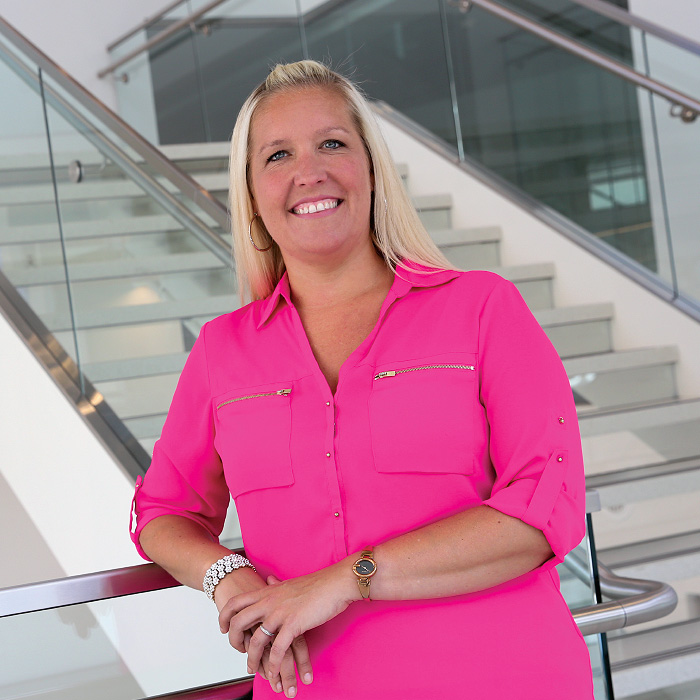
Since the COVID-19 outbreak, two-time Excelsior graduate Alison Noone has been working hard to help the students of Ocean County Community College transition to a virtual learning experience. Photo: Kris Qua
Alison Noone uses technology to keep students engaged from a distance
Two-time Excelsior graduate Alison Noone is the assistant director of student life at Ocean County Community College on the Jersey Shore. She has experienced firsthand the toll the COVID-19 pandemic has had on institutions of higher learning. Still, she and her staff have taken successful steps to adjust to the new norm, including developing a mobile device app that helps students keep in contact with each other and the community college.
Noone has been with Ocean County Community College for almost two decades, starting as a student worker in the Student Life Office and then taking on positions of increasing responsibility. She is currently in charge of keeping students engaged and encouraging them to progress forward with their studies.
Since the COVID-19 outbreak, Ocean County Community College has gone 100 percent remote. Noone can appreciate that it might be difficult for many students to transition to online-only learning. “I feel for the students who didn’t want to take classes online. I’ve taken classes online and I’ve taken classes as a student traditionally, face to face, and it is a transition. If you’re forced into it, I understand that it’s hard to accept and it’s a hard concept,” she says.
The plans for offering all classes, except for certain biology labs, remotely will continue at least through the spring 2021 semester. So, student engagement will also take place online. Students engage with the college virtually, via Canvas for courses, and through an app that the Student Life Office developed in conjunction with the communications company Ready Education.
Since the COVID-19 outbreak, Ocean County Community College has gone 100 percent remote. Noone can appreciate that it might be difficult for many students to transition to online-only learning.
Normally the app is just a supportive tool, but now that everything is virtual, it has become like a lifeline for students. “Whenever something big [happens] or big announcement will come out, we will have a spike of 1,000 sign-ups onto the app a day — we’ve had a flurry of posts and questions,” Noone says. Students have come to embrace the app’s functionality that allows them to communicate with each other and the college.
Alison Noone visits the campus regularly to run the college’s food pantry, which provides prepared food boxes to students in need.
Photo: Courtesy of Alison Noone
Noone says they have been able to use the app to follow when and how many students check into the app throughout the day. With information like this, they have conducted trivia contests, set up virtual clubs, and even held movie nights where students could watch a movie on their computers or smart devices and participate in a corresponding chat with others on the side of the screen. With all the creative ways Noone’s department has used the app, Ready Education recognized them for their best practices.
The extracurricular leadership program that Noone runs for students has also changed to a more virtual experience. Normally a three-part series with public speakers, Noone has worked to provide the program’s courses online with recorded presentations and links to videos from her Student Life colleagues. The program does not count toward college credit, but it is a great resume booster, says Noone.
The Student Life Office works entirely remote, but Noone visits the campus regularly to run the college’s food pantry. The pantry technically isn’t open during this time to collect donations, so Noone has been partnering with a local food bank to provide prepared food boxes to students in need. Students sign up in advance to reserve a food box and then come to the campus to pick it up. The food boxes are placed directly in the students’ car trunks to minimize social contact. For students who are not able to travel to the campus, Noone personally mails them gift cards the college has purchased from a local grocery store so they can get the supplies they need.
Remaining virtual appears to be the norm for the remainder of 2020 and Noone is committed to ensuring students have the tools and methods they need to meet their educational needs. “I want students at Ocean [County Community College] to succeed and believe they can, despite all the challenges they must overcome,” she says.
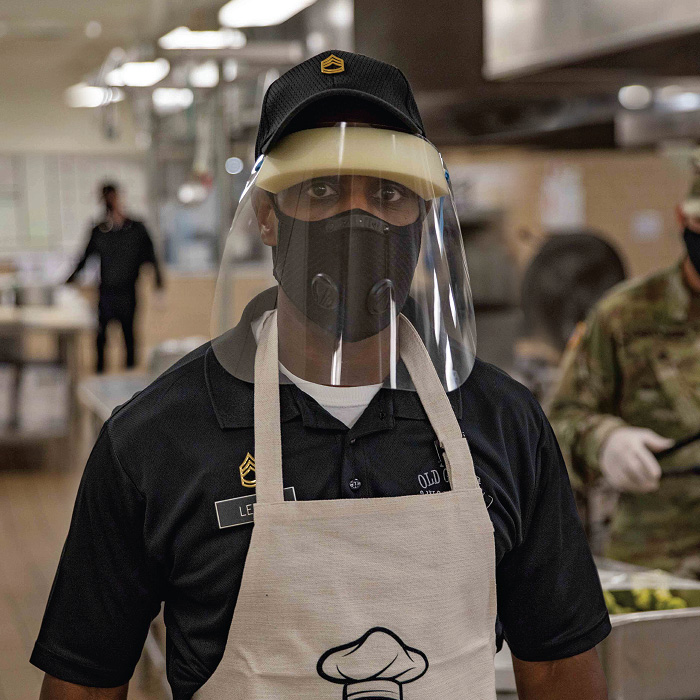
Timothy Leaks maintains a tight ship to keep servicemembers safe and fed
Feeding 300 servicemembers per meal during a pandemic might seem like a straightforward task, but it is not as easy as it sounds.
Timothy Leaks, the dining facility manager for the 3d U.S. Infantry Regiment’s (The Old Guard) facility in Arlington, Virginia, is charged with this task every day. However, thanks to guidance from the Centers for Disease Control and Prevention (CDC) and the state, he makes sure his staff continue feeding customers while staying safe.
“Since COVID-19 happened, we had to basically modify and kind of restructure the way we do business here,” says Leaks. Prior to the pandemic, servicemembers were permitted to eat in the cafeteria, but now the place runs like many other restaurants around the United States by offering only carry-out and pre-packaged meals. The changes are necessary for the cafeteria to remain functional. Leaks says closing the cafeteria is not an option; it is the only facility in the area that can feed the servicemembers. So, Leaks and his staff must make sure their facility is completely clean or it is not allowed to open for service.
Leaks, a 2019 graduate with a Bachelor of Science in Liberal Arts, is enrolled in Excelsior College’s Master of Science in Criminal Justice program. He and his staff have been following CDC protocols, maintaining social distancing, wearing masks and shields, and wearing gloves at all times. It’s up to Leaks to monitor his staff and ensure they are staying safe. “I make sure we keep our distance, make sure we wash our hands like we’re supposed to … I walk around and make sure everybody’s doing what they’re supposed to,” says Leaks. Sometimes maintaining social distancing when preparing food close together is hard. For example, it is typically uncomfortable for staff when the temperature in the kitchen can reach upward to 120 degrees Fahrenheit. Now, with adding the necessary safety measures due to the pandemic, moving around the hot kitchen has become even less pleasant.
He and his staff have been following CDC protocols, maintaining social distancing, wearing masks and shields, and wearing gloves at all times. It’s up to Leaks to monitor his staff and ensure they are staying safe.
To help ease pressure on the kitchen staff and to further prevent contamination, Leaks organized staff into a morning shift and an afternoon shift so they could come into work and leave without interacting with each other. Setting up shifts this way has helped minimize the risk of spreading the COVID-19 virus. Unfortunately, when staff have gotten sick, work has become difficult because there are usually only 13 people assigned per shift. So, when a few people have gotten sick and needed to quarantine, their absence made working more stressful for the staff.
Still, Leaks and his team have pushed through and have managed to keep feeding the hungry servicemembers who come through the cafeteria doors. Anyone who comes into the cafeteria has their temperature checked and must wear a mask at all times. Adhering to these guidelines is critical so that Leaks can properly manage the operation. Leaks and his staff not only follow safety guidelines, but also receive updates on the virus from medical staff and briefings on sanitation procedures.
Alumnus and current student Timothy Leaks oversees that the dining facility at the 3d U.S. Infantry Regiment in Arlington, Virginia, maintains safety protocols, like serving only pre-packaged meals to servicemembers.
Photos of Timothy Leaks: Sgt. Gabriel Silva, U.S. Army
Leaks believes the new safety procedures will be in place well beyond the next few months. “Even when COVID-19 goes away, these are things I could see happening for the perceived future,” he says. That’s okay with him because he thinks people in addition to his staff should have been taking simple safety precautions, like washing their hands correctly, all along. The contagion factor of the virus is something personal to Leaks; he has a high-risk spouse and a young child at home so he knows how important it is to keep safety protocols in place. In fact, as soon as Leaks returns home from work, he goes right to the garage to change his clothes, wash up, and wipe down his car. When his family is involved, he doesn’t want to take any chances.
And, Leaks is thankful for his supportive family and also a behavioral therapist with whom he can talk when things get too stressful. He often worries about customers being exposed to COVID-19 and is concerned about the lack of knowledge surrounding the virus. Despite these concerns, Leaks maintains order for his staff and provides them with the information and supplies they need to do their job well. And if his staff are also stressed and worried, they have opportunities to contact professional services that the facility has supplied. As a 20-year veteran, Leaks is used to talking with someone and is glad there are providers available, offering support to frontline workers like him.
With Leaks’s oversight of the dining facility, servicemembers in the Arlington area are guaranteed a meal — or three — each day. By adhering to the rules, Leaks keeps his staff and customers safe. As a result, by also following his personal protocols and maintaining a sound mind, he is better prepared to lead his team so that they can provide food and a sense of normalcy during such a critical time.

Lakeya Collins takes extra measures to care for nursing home residents
According to a study published in USA Today, residents of nursing homes account for nearly 40 percent of the nation’s COVID-19 death toll. Amazingly, the nursing home where Lakeya Collins works saw zero cases of the virus until September 2020, in part because of the dedication Collins had to maintaining the residents’ safety.
Collins, a 2018 graduate who earned an associate degree in nursing, has been working to help maintain the low virus infection rate at The Place at Dean’s Bridge, a skilled nursing facility in Augusta, Georgia. As of mid-September, the nursing home had 16 confirmed cases, but for over six months before that, the nursing home had zero cases. This is a remarkable feat since in Richmond County, where Augusta is located, there were approximately 785 cases of COVID-19 by late June and the number of people diagnosed with COVID had increased by 8.4 percent since then. On September 5, there were 280,000 cases in Georgia; 6,634 of those were in Richmond County.
The Place at Dean’s Bridge initially managed to keep infection rates at zero through the dedicated work of employees. At the onset of the virus’s spread, Collins joined a special COVID-19 taskforce to help implement and maintain safety procedures so that residents at the facility remained safe from infection. The facility has continued to follow the Centers for Disease Control and Prevention (CDC) guidelines and has maintained strict social distancing rules to avoid contamination between staff. Residents are tested twice a week for the virus to keep tabs on its spread.
Since visitors aren’t allowed, so that the facility can maintain social distancing, Collins has taken it upon herself to make sure her patients have contact with their loved ones.
As a member of the task force, Collins is in charge of ensuring residents’ vital signs are checked but says they can assess only those residents who have had a negative COVID-19 test. She also takes extra steps to look after the patients’ emotional well-being. Since visitors aren’t allowed, so that the facility can maintain social distancing, Collins has taken it upon herself to make sure her patients have contact with their loved ones. By lending them her personal cell phone, they can make FaceTime calls with family members. She also tries to dissuade residents from watching COVID-19–related news because she doesn’t want them to get upset from the negative information. Keeping positive with the residents is difficult, but Collins tries to add some happiness into everyone’s day. “I might go buy them chicken nuggets — just something to keep them going, to put a smile on their faces,” Collins says. She also plays music and reads scripture to many of the residents, which keeps them looking on the bright side.
Admittedly, Collins was nervous and even paranoid in the earlier months of the pandemic, constantly checking her temperature and making sure not to come in contact with others. Seeing people on the local and national news on ventilators and in intensive care units was hard, so it made her work stressful. Over time, she says she has gotten used to it. “It’s like everything else in nursing; you become accustomed to it. You do what you’re supposed to do,” she says. Now that several residents are infected, Collins makes extra sure she maintains proper safety measures, including washing her hands before going home. Although she is taking precautions, she doesn’t want to inadvertently spread the virus to her 10-year-old son. “That’s my biggest fear, but we do our best to make sure going through our daily lives is safe,” she says.
Collins feels she’s done a good job caring for the residents and works hard to follow the CDC and her facility’s guidelines. During this pandemic, she wants people to understand what really goes on in hospitals and facilities such as The Place at Dean’s Bridge to keep people safe, and to pay attention to the virus. She says, “I just want people to take it [COVID-19] more seriously so we can get past this part of the numbers increasing, we can get a vaccine, and people can go on with their lives at a safe space in the midst of it.”
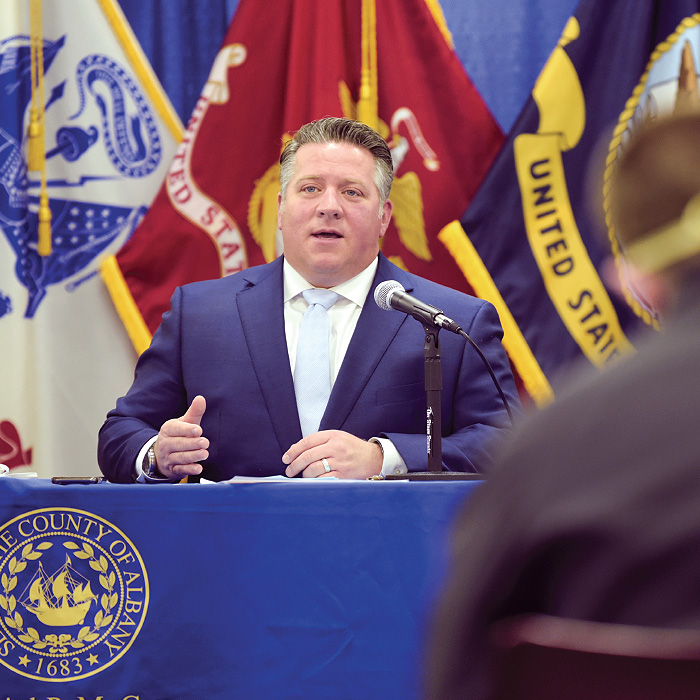
Albany County Executive Dan McCoy speaks at his daily press conference to discuss covid-19 cases in the county on May 12, 2020, in Albany, N.Y.Photo: Courtesy of Paul Buckowski/Times Union
